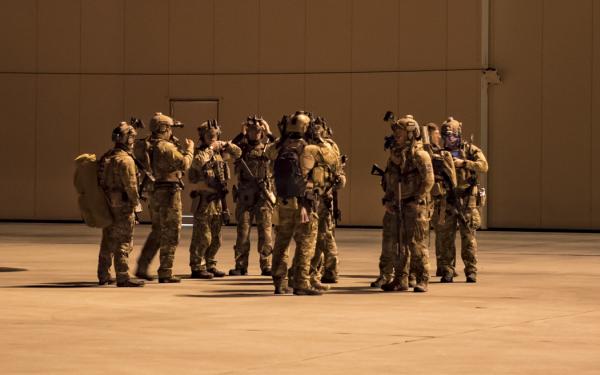As the fight against the Islamic State in Syria (ISIS) draws to a bloody conclusion, the question of what will happen to the ISIS prisoners of war (POWs) who were captured by the U.S.-led international coalition or its local partners becomes increasingly pressing.
During a Senate Armed Services Committee hearing, General Raymond Thomas, the head of the U.S. Special Operations Command (SOCOM), said that the coalition and its partners have close to “a thousand already in detention, with more to potentially come.” General Thomas emphasized the danger that these POWs pose to American interests and the region’s stability.
The ISIS POWs aren’t detained by the Iraqi government, but rather by the Syrian Democratic Forces (SDF), a coalition of groups led by the Kurdish Peshmerga. During the hearing, General Thomas noted that the SDF is a non-state actor, inferring that the group operates outside the international system that guides modern warfare.
“How we reduce that threat and keep those people properly detained and handled over time is of paramount importance right now,” added General Thomas.
The SOCOM commander also acknowledged the contribution of some U.S. partners to mitigating this judicial conundrum. “I’ll give kudos right now to some of the countries that have stepped up, particularly some of the smaller countries that have capacity challenges, but nevertheless have started to assume the burden,” he said.
But not everything is rosy. Some European countries have refused to repatriate their citizens who fought for ISIS or try them in their courts.
Some lawmakers were quite truculent and proposed bringing some of the captured ISIS fighters to Guantanamo Bay. “We have empty beds at Guantanamo Bay, don’t we?” remarked Senator Tom Cotton (R-Ark). “Maybe we should consider that for some of those really bad guys in Syria.”
Throughout the hearing, several senators adroitly delineated that, in a counterterrorism context, the threat that a terrorist group or organization poses isn’t measured in acres of territory that they control but rather in the capabilities of the group or organization.
“We’re on the verge of diminishing the threat and in the process of determining what residual capability needs to remain in place in the region to ensure that we’re securing that objective,” said General Thomas, referring to assessing the power that ISIS fighters could exert even without a territorial base. He noted that, despite being pushed all the way back to Syria, ISIS elements had attempted to reignite an insurgency in Iraq. It is important to note the porous nature of the borders between the two nations. Years of warfare and a constant shift of territorial sovereignty by numerous groups, to include ISIS, the Kurds, and the Iraqi government, have rendered previous boundaries functionally useless.
Already have an account? Sign In
Two ways to continue to read this article.
Subscribe
$1.99
every 4 weeks
- Unlimited access to all articles
- Support independent journalism
- Ad-free reading experience
Subscribe Now
Recurring Monthly. Cancel Anytime.











COMMENTS